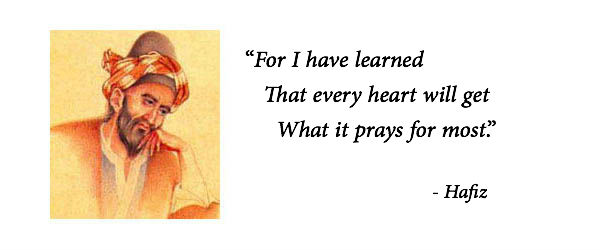Hafiz – Sufi mystic and a 14th-century Persian poet. Also known as Khwajeh Shams al-Din Muhammad Hafez-e Shirazi, mystic and poet. Sometimes credited as “Hafiz” or “Hafiz of Shiraz”. Themes of his poetry include love, devotion, God, faith, hypocrisy and a mystical view of life.
Hafiz Poems
Last night, as half asleep I dreaming lay,
Half naked came she in her little shift,
With tilted glass, and verses on her lips;
Narcissus-eyes all shining for the fray,
Filled full of frolic to her wine-red lips,
Warm as a dewy rose, sudden she slips
Into my bed – just in her little shift.
Said she, half naked, half asleep, half heard,
With a soft sigh betwixt each lazy word,
‘Oh my old lover, do you sleep or wake!’
And instant I sat upright for her sake,
And drank whatever wine she poured for me –
Wine of the tavern, or vintage it might be
Of Heaven’s own vine: he surely were a churl
Who refused wine poured out by such a girl,
A double traitor he to wine and love.
Go to, thou puritan! the gods above
Ordained this wine for us, but not for thee;
Drunkards we are by a divine decree,
Yea, by the special privilege of heaven
Foredoomed to drink and foreordained forgiven.
Ah! Hafiz, you are not the only man
Who promised penitence and broke down after;
For who can keep so hard a promise, man,
With wine and woman brimming o’er with laughter!
O knotted locks, filled like a flower with scent,
How have you ravished this poor penitent!
Ode 44 – Translated by Richard Le Gallienne
With last night’s wine still singing in my head,
I sought the tavern at the break of day,
Though half the world was still asleep in bed;
The harp and flute were up and in full swing,
And a most pleasant morning sound made they;
Already was the wine-cup on the wing.
‘Reason,’ said I, ‘’t is past the time to start,
If you would reach your daily destination,
The holy city of intoxication.’
So did I pack him off, and he depart
With a stout flask for fellow-traveller.
Left to myself, the tavern-wench I spied,
And sought to win her love by speaking fair;
Alas! she turned upon me, scornful-eyed,
And mocked my foolish hopes of winning her.
Said she, her arching eyebrows like a bow:
‘Thou mark for all the shafts of evil tongues!
Thou shalt not round my middle clasp me so,
Like my good girdle – not for all thy songs! –
So long as thou in all created things
Seest but thyself the centre and the end.
Go spread thy dainty nets for other wings –
Too high the Anca’s nest for thee, my friend.’
Then took I shelter from that stormy sea
In the good ark of wine; yet, woe is me!
Saki and comrade and minstrel all by turns,
She is of maidens the compendium
Who my poor heart in such a fashion spurns.
Self, HAFIZ, self! That thou must overcome!
Hearken the wisdom of the tavern-daughter!
Vain little baggage – well, upon my word!
Thou fairy figment made of clay and water,
As busy with thy beauty as a bird.
Well, HAFIZ, Life’s a riddle – give it up:
There is no answer to it but this cup.
Ode 487 – Translated by Richard Le Gallienne


